

Don’t Grade Schools on Grit. Still, separating character into specific strengths doesn’t go far enough.
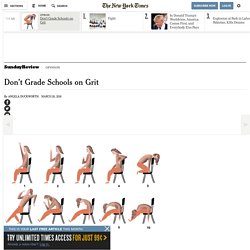
As a teacher, I had a habit of entreating students to “use some self-control, please!” Such abstract exhortations rarely worked. My students didn’t know what, specifically, I wanted them to do. In designing what we called a Character Growth Card — a simple questionnaire that generates numeric scores for character strengths in a given marking period — Mr. Levin, Mr. For instance, the character strength of self-control is assessed by questions about whether students “came to class prepared” and “allowed others to speak without interrupting”; gratitude, by items like “did something nice for someone else as a way of saying thank you.” Most students and parents said this feedback was useful.
To encourage self-reflection, we asked students to rate themselves. This model still has many shortcomings. This is exciting progress. MY concerns stem from intimate acquaintance with the limitations of the measures themselves. To reduce student suspensions, teachers should try being more empathetic. School suspension rates have nearly tripled in the United States since the 1970s, rising from just 3.7% of all students in 1974 to nearly 11% in 2011.
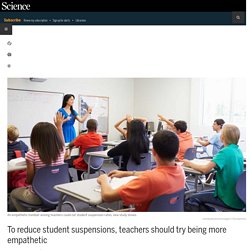
That’s a big deal because missed class means missed learning, and suspensions can predict future unemployment and even incarceration. Now, a new study suggests that even a minor attitude adjustment among teachers can have a dramatic effect on those rates: Math teachers encouraged to be more empathetic saw student suspensions drop by half. Psychologist Jason Okonofua, who led the new study, spent his early years attending public school in Memphis, Tennessee. In 10th grade, his good grades landed him a spot at a prep school in Rhode Island. When he arrived, Okonofua was struck by how differently the teachers responded to their students—if a student felt something was wrong and spoke out, for example, teachers would encourage him to voice his opinions. The team tracked suspension rates for a year after the exercises. What Is Lost When Kindergarten Gets More Academic?
“What are some of the things that the monsters like to eat in this story?”
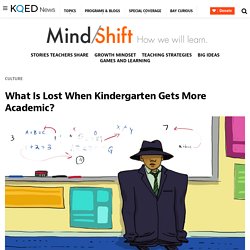
Teacher Marisa McGee asks a trio of girls sitting at her table. McGee teaches kindergarten at Walker Jones Elementary in Washington, D.C. Today’s lesson: a close reading of the book What Do Monsters Eat? “They like to eat cake,” says one girl. “I noticed you answered in a complete sentence,” McGee says. “Stinky socks!” McGee follows with a line you might not expect in a kindergarten class: “Can you show me the page where you found that?” Textual evidence. “When I came into kindergarten, down from first grade, I was like: Yes! If you have young kids in school, or talk with teachers of young children, you’ve likely heard the refrain — that something’s changed in the early grades. A big new study provides the first national, empirical data to back up the anecdotes. The authors chose to compare teachers’ responses from two years, 1998 and 2010. "It's Not What's Wrong With the Children, It's What's Happened to Them"
It has been said to me many times that it's the child who is acting out that needs you the most.
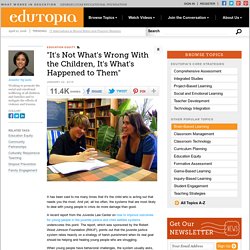
And yet, all too often, the systems that are most likely to deal with young people in crisis do more damage than good. A recent report from the Juvenile Law Center on how to improve outcomes for young people in the juvenile justice and child welfare systems underscores this point. The report, which was sponsored by the Robert Wood Johnson Foundation (RWJF), points out that the juvenile justice system relies heavily on a strategy of harsh punishment when its real goal should be helping and healing young people who are struggling. When young people have behavioral challenges, the system usually asks, "What is wrong with this child, and how do we stop it? " Instead, they ought to be asking, "What happened to this child, and how do we help them?
" We see the same problems in our education system as well. Reasons for Hope Alternatives and Solutions Trauma Smart System of Care The Safe Schools Consortium. What Changes When a School Embraces Mindfulness? It was lunch time at Marysville School in Southeast Portland when the fire broke out.
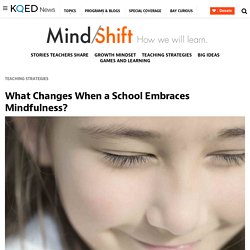
Teachers quickly herded their students out of the building to the sports field behind the school as the old colonial-style building burned. The fire that traumatized students and staff alike was in 2009, when Lana Penley was in her second year as principal. The 460 students and 50 staff members of the K-8 school relocated to a vacant school building in another part of Portland, displaced from their school site for three years as the district rebuilt the Marysville building. “We were already a school that struggled, and then adding [the fire] on top of it, we really thought we needed to find a social and emotional curriculum that connects to the heart to overcome our trauma,” Penley explained. The program is a blend of neuroscience, social and emotional tenets like empathy and perspective taking, and mindfulness, a practice which many schools have already started exploring.